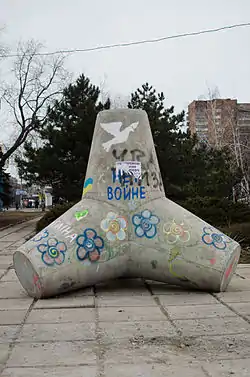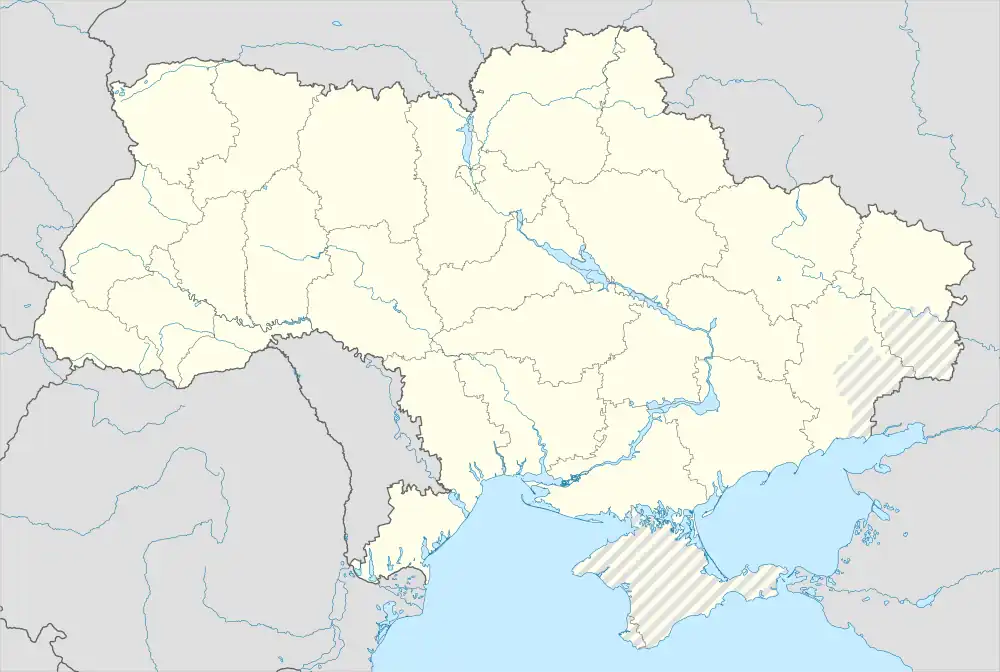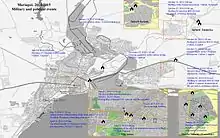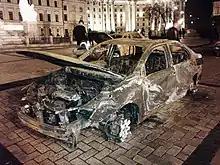January 2015 Mariupol rocket attack
A rocket attack on Mariupol was launched on 24 January 2015 by Russian and pro-Russian forces against the strategic maritime city of Mariupol, defended by Ukrainian government forces. Mariupol had come under attack multiple times in the previous year in the course of the War in Donbas, including in May–June 2014, when the city was under the control of Russian controlled forces; and in the September 2014 offensive.
| January 2015 Mariupol rocket attack | |
|---|---|
| Part of War in Donbas | |
 Tetrapod in Mariupol with pro-Ukrainian and pro-peace graffiti | |
 Location of Mariupol in Ukraine | |
| Location | Mariupol, Donetsk Oblast, Ukraine |
| Date | 24 January 2015; 8 years ago |
Attack type | Rocket attack |
| Deaths | 31[1][2] |
| Injured | 108[3][4] |
| Perpetrators | |
On 24 January 2015, the Mariupol city council and regional police said the city was subjected to indiscriminate[7] rocket fire from the long-range Grad systems, killing at least 30 and injuring 128.[8] Ukrainian officials said the rebels and the Russian military were responsible.[9] According to Ukrainian intelligence, the attack was ordered by full-time Russian military commanders.[10] In 2018, the Bellingcat open-data investigative group revealed evidence that officers and equipment of Russian forces were directly involved in the attack.[11][12] The rebels denied the attack, but their leader, Alexander Zakharchenko, announced an offensive against Mariupol later that day.[13][14]
According to a spot report by the OSCE Special Monitoring Mission to Ukraine, the Grad and Uragan rockets originated from the areas controlled by the pro-Russian forces.[15][16] United Nations political chief Jeffrey D. Feltman said the attacks "knowingly targeted civilians," violated international humanitarian law, and could amount to war crimes.[17] The attack on Mariupol came 11 days after the deadly Volnovakha bus attack, when a rocket strike targeted a government checkpoint in the town of Volnovakha, hitting a passenger bus which resulted in the death of 12 civilians. Government officials attributed the incident to the separatists, but the rebels denied carrying out the attack.[18]
Background

Mariupol and Battle of Debaltseve were high-stake arenas for pro-Russian and Ukrainian forces as both cities are vital transport hubs, described as a "gateway to a land-bridge" to Russian-annexed Crimea, and strategically crucial to the pro-Russian objective of opening up and linking areas under their control with a view to securing the entire Donetsk and Luhansk regions.[19]
On 22 January, pro-Russian extremists tried to attack Ukrainian positions on North-East of the city but failed.[20] The next day, Alexander Zaharchenko vowed to fight until he reached the border of the Donetsk Oblast. Separatists reportedly began a tank offensive, and also conducted attacks near the west of the city. The village of Talakivka was reportedly shelled hard by separatists, but Ukrainian forces were "holding on". Andriy Lysenko confirmed the shelling, but said the separatists were still incapable of shelling the city itself because Ukrainian forces had not let them get close enough. Dmitry Tymchuk, a military blogger, reported on Facebook that a convoy of DPR tanks and APCs were advancing towards the city.[21]
Attack

On 24 January, a major escalation took place after a rocket attack killed many people.[22][23][24][25][26] Mariupol city authorities said that a Grad rocket hit a residential area in the city, and killed 20 people. Video footage showed that cars, buildings, and apartment flats were in flames as a result of the attack. The attack appeared to come from a multiple rocket launcher. One resident told Agence France-Presse on the telephone that the rebels had managed to seize Mariupol Airport, although rebels made no comment about that alleged airport seizure. The airport is located some 20 kilometers behind the front line. The rebels denied any involvement in the attack.[27]
The rocket attacks came a day after the rebels rejected a peace deal and announced they were going on a multi-prong offensive against the government forces in Kyiv to vastly increase their territory.[7] Despite rebel denials, Donetsk rebel leader Alexander Zakharchenko said that his forces had started an offensive on Mariupol, and rejected further talks with Kyiv; Zakharchenko said that "Today an offensive was launched on Mariupol. This will be the best possible monument to all our dead." Zakharchenko also stated that was is a provocation as DPR militants did not have the mentioned artillery systems and according to his sources the shelling was conducted from Staryi Krym.[28] The death count rose to 27 people, with several more injured. Ukrainian Prime Minister Arseniy Yatsenyuk called for an urgent meeting of the UN Security Council.[29]
A Ukrainian military checkpoint was also hit in the attack, killing one soldier. The city council urged citizens of Mariupol not to panic and said that "all units are fully battle-ready. Security measures in the city have been strengthened."[30] The General Secretary of NATO, Jens Stoltenberg, condemned the attack, urging Russia to stop supporting the rebels.[31] President Petro Poroshenko considered the attack a "crime against humanity", and cancelled his trip to Saudi Arabia. He also vowed to deliver a "full victory" over the rebels.
According to OSCE observers "Grad" and "Uragan" rockets were used in this attack, originating from villages of Oktyabr (19 km NE) and Zaichenko (15 km NE), both controlled by separatist forces.[32] Later, pro-Russian extremists said they were not going to storm Mariupol and the offensive was only to strengthen positions around the city.
The next day, President Poroshenko vowed to calm the recent fighting in the strategic port city. Speaking at an emergency meeting at the Ukrainian Security council, he said that the Minsk Protocol signed on September 5 was the only solution to end the conflict. He said intercepted radio conversations proved that pro-Russian extremists were behind the attacks, but that the conversations hadn't yet been confirmed. Russia denied involvement in the attack, saying it was a result of Ukrainian forces shelling residential areas indiscriminately.[33] Petro Poroshenko said Ukrainian forces killed most of the rebels involved in the shelling, and put the rebel casualties at 110. Six Grad missile launchers were also destroyed according to him, and he said that the SBU brought the artillery gun spotter back to Kyiv for questioning.[34]
The Security Service of Ukraine (SBU) published a detailed timeline of the rocket attack.[35]
Aftermath
On 27 January, Azov Battalion members started training outside Mariupol should a rebel attack occur. Two of its members were killed in an attack on a checkpoint near the city the next day.[36] On 1 February, the villages of Talakovka and Pavlopol near Mariupol city were heavily shelled by pro-Russian extremists, according to Ukrainian forces.[37] On 3 February, separatists reportedly tried to attack Mariupol, but Ukrainian forces claimed they destroyed two enemy tanks and a group of insurgents near the city.[38]
On 4 February, the Ukrainian SBU reported that they had successfully completed a special operation to liquidate the detachment of Russian Army which had conducted this attack.[39]
On 10 February, the National Guard and the Azov Battalion launched an offensive on the town of Novoazovsk[40] and quickly managed to capture the towns of Shyrokyne, Pavlopil, Kominternovo[41] and Oktyabyr. Ukrainian forces managed to push the separatists back to Sakhanka, where the rebels were fighting back.[42] However, fighting continued in the area and by late April, Deutsche Welle reported that pro-Russian militants had set up positions in the centre of Shyrokyne.[43]
International reactions
The attack was condemned in a public statement by the High Representative of the European Union for Foreign Affairs and Security Policy, Federica Mogherini.[44] The condemnation by the United Nations Security Council was vetoed by Russia on the ground that the condemnation sought to blame Alexander Zakharchenko's announcement of beginning of the attack on Mariupol as irresponsible and condemned separatist forces which, according to Russia, are "self-defense forces".[45] The attack and "provocative statements by self-defense leaders" were eventually condemned by UN Secretary-General Ban Ki-moon.[46] The attack was also condemned by NATO.[47]
See also
References
- "Shelling in Mariupol: 29 people killed, 102 wounded (UPDATE, VIDEO)". KyivPost. 24 January 2015. Retrieved 24 January 2015.
- "Ukraine: Rising Civilian Death Toll - Human Rights Watch". 3 February 2015. Retrieved 6 February 2015.
- "Confirmed death toll from Mariupol rocket attack rises to 31". Ukraine Today. 28 January 2015. Retrieved 28 January 2015.
- "Количество погибших в Мариуполе увеличилось до 31 человека - МВД". Ukrayinska Pravda. 28 January 2015.
- "SBU says it has proof Russian military were behind Mariupol shelling that killed 30 people (VIDEO)". KyivPost. 26 January 2015. Retrieved 27 January 2015.
- Oleksandr Turchynov (24 January 2015). "Відповідальність за вбитих мирних громадян внаслідок обстрілу Маріуполя лежить безпосередньо на Путіні, — заява Секретаря РНБО України" [Responsibility for civilians killed as the result of the shelling of Mariupol lies squarely with Putin — stated the NSDC Secretary of Ukraine]. National Security and Defense Council of Ukraine (in Ukrainian). Retrieved 20 February 2015.
- Leonard, Peter (Jan 24, 2015). "Rockets Kill 29 in Ukrainian City as Rebels Launch Offensive". ABCNews. Archived from the original on 2015-01-24.
- "Маріупольці вшанували пам'ять жертв обстрілу Східного". Громадське ТБ Приазов'я (in Ukrainian). 2016-01-24. Retrieved 2017-12-01.
- "Missile attack kills at least 15 in Mariupol, east Ukraine". The Guardian. 24 January 2015. Retrieved 24 January 2015.
- Olearchyk, Roman (26 January 2015). "Nato accuses Russia over worsening Ukrainian crisis". Financial Times. Retrieved 27 January 2015.
- "Bellingcat: 9 Russian officers directed Ukraine attack". AP NEWS. 2018-05-07. Retrieved 2019-02-05.
- "Full Report: Russian Officers and Militants Identified as Perpetrators of the January 2015 Mariupol Artillery Strike". bellingcat. 2018-05-10. Retrieved 2019-02-05.
- "Rebels say launched attack on Mariupol as 20 killed in east Ukraine city". Reuters. 24 January 2015. Retrieved 24 January 2015.
- Reuters Staff (2015-01-24). "Ukrainian rebel leader says separatists launched attack on Mariupol: RIA". Reuters. Retrieved 2021-04-08.
{{cite news}}:|author=has generic name (help) - OSCE Special Monitoring Mission to Ukraine. "Spot report by the OSCE Special Monitoring Mission to Ukraine (SMM), 24 January 2015: Shelling Incident on Olimpiiska Street in Mariupol". OSCE. Mariupol. Retrieved 24 January 2015.
- "Ukraine rebels launch new assaults after Mariupol bloodbath". Telegraph.co.uk. 25 January 2015. Retrieved 6 February 2015.
- "UN: Deadly Attack on Ukraine City Could Be War Crime". The New York Times. Associated Press. 26 January 2015. Retrieved 19 February 2015.
- "Ukraine conflict: Shell hits bus 'killing 12' in Buhas". BBC News. 13 January 2015.
- Catherine A. Fitzpatrick (15 February 2015). "Why Ukraine is Fighting to Hang on to Debaltsevo - and What it Means if They Lose It". The Interpreter. Retrieved 16 February 2015.
- "Ukrainian military repel militants' attack near Mariupol". NRU1. 22 January 2015. Archived from the original on 26 June 2015. Retrieved 28 February 2015.
- Damien Sharkov (23 January 2015). "Civilians Caught in Crossfire as Ukraine Separatists Make Gains". Newsweek. Retrieved 28 February 2015.
- "Rockets kill 30 in Mariupol as rebels launch offensive". BBC News Online. 24 January 2015. Retrieved 28 February 2015.
- "Rockets rain on eastern Ukrainian port city, killing at least 27". Mashable.com. 24 January 2015. Retrieved 24 January 2015.
- Adrew E. Kramer (24 January 2015). "At Least 10 Killed in Rocket Attack in Eastern Ukraine Port City". The New York Times. Retrieved 24 January 2015.
- "Ukraine crisis: Rockets 'kill 10' in Mariupol". BBC News Online. 24 January 2015. Retrieved 24 January 2015.
- "Rebel shelling kills up to 10 people in east Ukrainian city of Mariupol: officials". Reuters. 24 January 2015. Retrieved 24 January 2015.
- "Ukraine crisis: Rockets 'kill 20' in Mariupol". BBC. 24 January 2014. Retrieved 27 February 2015.
- "ДНР: у ополчения нет артиллерии, способной нанести удар по Мариуполю" [DPR: the militia does not have artillery capable of striking Mariupol]. RIA News (in Russian). 24 January 2015.
- "Ukraine crisis: Rebels 'begin offensive' on Mariupol". BBC. 24 January 2015. Retrieved 28 February 2015.
- Peter Leonard (24 January 2015). "Rebel launch major offensive on key Ukrainian port of Mariupol". Globe and Mail. The Associated Press. Retrieved 27 February 2015.
- "NATO Secretary General statement on the attack on Mariupol". NATO Press Release. 24 January 2015. Retrieved 28 February 2015.
- "Spot report by the OSCE Special Monitoring Mission to Ukraine (SMM), 24 January 2015: Shelling Incident on Olimpiiska Street in Mariupol". OSCE. 24 January 2015. Retrieved 24 January 2015.
- "Ukraine conflict: Poroshenko vows to 'calm' Mariupol fighting". BBC. 25 January 2015. Retrieved 28 February 2015.
- "СБУ: докази причетності російських військових до злочинів проти людяності. ВІДЕО // Magnolia-tv. — 27 January 2015". Archived from the original on 2 April 2015. Retrieved 22 March 2015.
- "Обстрел террористами Мариуполя" [Shelling of Mariupol by terrorists] (in Russian). Security Service of Ukraine. 26 January 2015. Retrieved 26 January 2015.
- "Azov Battalion trains for defense of Mariupol". Kyiv Post. 28 January 2015. Retrieved 28 February 2015.
- "Ukraine Today: Mariupol rocket attack; residents of Ukrainian port city remember victims killed on January 24 (VIDEO)". Kyiv Post. 1 February 2015. Retrieved 28 February 2015.
- "Под Мариуполем силы АТО уничтожили два танка террористов - штаб обороны" [Armed Forces of Ukraine destroyed two terrorist tanks in Mariupol - Defence Headquarters]. New Times (in Russian). 3 February 2015. Retrieved 28 February 2015.
- "СБУ уничтожила российскую террористическую группу, обстрелявшую Мариуполь 24 января - Наливайченко" [Security Service of Ukraine has destroyed the Russian terrorist group who shelled Mariupol on January 24 - Nalyvaichenko]. Interfax.com.ua. 4 February 2015. Retrieved 19 February 2015.
- Pavel Polityuk; Alessandra Prentice; Louise Ireland (10 February 2015). "Ukrainian forces launch offensive near Mariupol, east Ukraine: Kiev". Reuters. Retrieved 28 February 2015.
- "Ukraine conflict: Battles rage ahead of Minsk talks". BBC. 10 February 2015. Retrieved 28 February 2015.
- Staff writers; Maxim Tucker (10 February 2015). "Azov Battalion spearheads Ukrainian counter-offensive". Kyiv Post. Retrieved 28 February 2015.
- Hofmann, Frank (25 April 2015). "Ukraine: No end in sight for the women of Shyrokyne". Deutsche Welle.
- Federica Mogherini (24 January 2015). "Statement by High Representative/Vice-President Federica Mogherini on the attack on Mariupol". European Commission. Retrieved 24 January 2015.
- Edith M. Lederer (25 January 2015). "Russia blocks UN condemnation of shelling of Ukraine city". Salon. Archived from the original on 2016-03-05. Retrieved 25 January 2015.
- "UN chief Ban Ki-moon condemns Ukraine rebel offensive". Economic Times. 25 January 2015. Archived from the original on 2017-01-06. Retrieved 25 January 2015.
- "NATO Secretary General statement on the attack on Mariupol". NATO Press Release. 25 January 2015. Retrieved 25 January 2015.